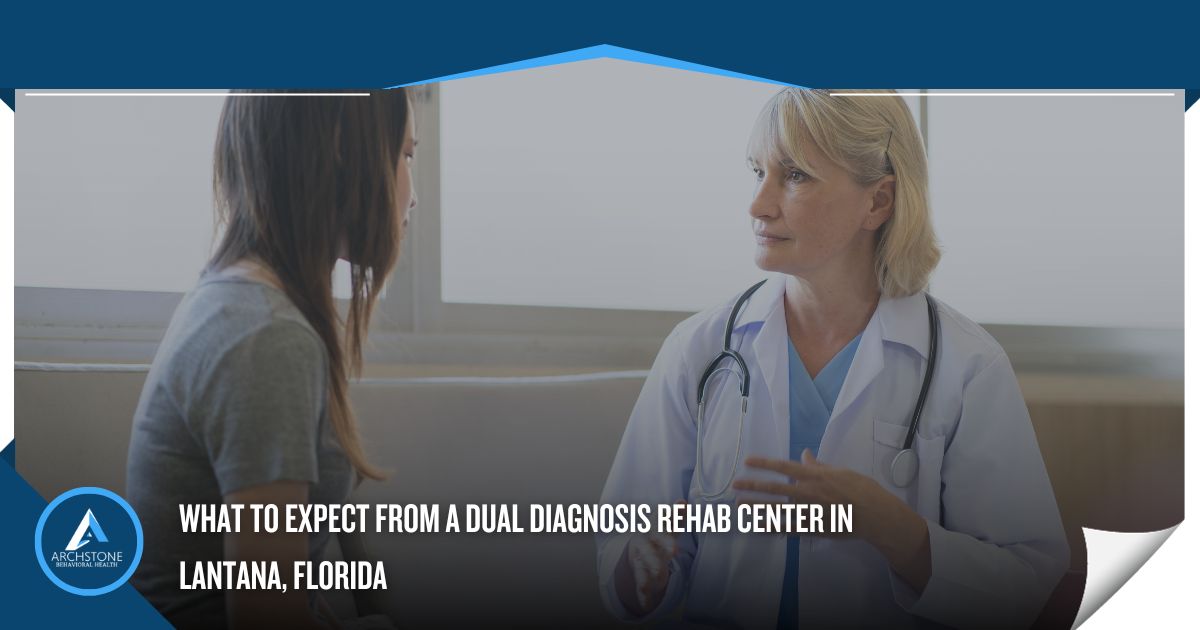What to Expect from a Dual Diagnosis Rehab Center in Lantana, FL
Get Help Now
Co-occurring disorder is a term used to describe having a mental health condition and a substance use disorder at the same time. According to the Substance Abuse and Mental Health Services Administration (SAMHSA), “approximately 9.2 million adults in the United States have a co-occurring disorder.”[1]
Oftentimes, mental illnesses and addictions exacerbate the symptoms of one another, making treatment complicated. Thankfully, dual diagnosis treatment programs in Florida combine traditional addiction treatment methods with evidence-based mental health techniques to make recovery possible.
If you or a loved one suffer from co-occurring disorders, you might be wondering what to expect from a dual diagnosis rehab center in Lantana, FL. Being aware of how these programs work can motivate you to seek the help you need.
What Types of Mental Health Conditions Are Treated in Dual Diagnosis Treatment Programs in Lantana, FL?
Florida dual diagnosis programs are designed to help clients overcome addiction and mental health issues simultaneously. While certain programs might specialize in a specific mental illness, most of these programs can address just about every mental health condition known to man. At Archstone Behavioral Health, we only hire the most qualified mental health professionals, ensuring that each client will receive the help they need no matter their diagnosis.
Examples of mental health conditions that can be treated during a dual diagnosis rehab program in Lantana, FL include:
- Depression
- Conduct disorders
- Anxiety disorders
- Bipolar disorder
- Attention-deficit hyperactivity disorder (ADHD)
- Schizophrenia
- Trauma-related conditions like post-traumatic stress disorder (PTSD)
- Personality disorders
When you enter a dual diagnosis program, you will receive an in-depth evaluation to determine what mental health condition you struggle with. This will provide the medical team with the information they need to provide you with adequate and relevant care.
What to Expect During a Dual Diagnosis Rehab Program in Lantana, FL
Dual-diagnosis treatment programs combine addiction and mental health treatment to help their clients overcome co-occurring disorders. When you attend a dual diagnosis facility in Lantana, FL, you will receive care for both your substance use disorder and your mental health condition.
Assessment and Individualized Treatment Planning
When you arrive at the facility you will undergo an in-depth assessment that will gather information about your substance abuse history and your mental health. These assessments will be used to create an individualized treatment plan to ensure that all of your unique needs are met.
The mental health assessment will be used to diagnose you with a condition so you can receive the appropriate, evidence-based therapies required for the management of your illness. On the other hand, your substance abuse assessment will provide the addiction specialists with the information they need to determine how severe your addiction is and what types of services you will require.
Evidence-Based Therapies
Once you complete your assessment, you will begin treatment. One of the most important aspects of dual diagnosis treatment is evidence-based behavioral therapy. A wide range of therapies are offered to ensure that each client can receive the modality that best suits their needs.
You will attend individual therapy sessions for both your addiction and your mental health condition. Some of the therapies used will depend on what type of mental health condition you struggle with. For example, people who have PTSD will receive trauma-informed care while individuals with borderline personality disorder will participate in dialectical behavior therapy (DBT).
Counseling Groups
In addition to individual therapy, you will participate in group counseling. The type of counseling group you are assigned to will depend on your needs. Individuals with a history of trauma will attend trauma-based groups while people with bipolar disorder might attend a group specifically focused on recovering from that mental health condition.
While you will receive group counseling focused on mental health, you will also attend groups that teach you how to maintain long-term sobriety from drugs and alcohol. These groups focus on relapse prevention skills, addiction education, and learning healthy coping mechanisms.
Medication Management
Lastly, if you require medication for your mental health condition you will have the ability to receive it. Typically, your psychiatrist will prescribe you non-addictive medications to help manage your symptoms without putting you at risk of relapsing. For example, anxiety is usually treated with SSRIs instead of benzodiazepines.
It is important to note that some individuals do not require medication, while others may only need it to stabilize while therapy begins to work its magic. Medication is only used when it is necessary and beneficial to your recovery.
Get Connected to a Top-Rated Dual Diagnosis Treatment Center in Lantana, FL
If you or a loved one struggles with co-occurring disorders, it’s time to seek professional help. Recovering from a mental illness and an addiction can be difficult, however, at Archstone Behavioral Health we provide our clients with the best possible care available.
The dual diagnosis treatment at Archstone Behavioral Health can simultaneously help patients work through co-occurring addiction and mental health concerns. Our staff collaborates with a patient’s primary care physician and psychiatrist–when available–to determine the best course of action for treating mental health and addiction issues simultaneously.
To learn more about our dual diagnosis program in Lantana, FL, contact us today.
References:
- the Substance Abuse and Mental Health Services Administration (SAMHSA): Co-Occurring Disorders and Other Health Conditions, Retrieved August 2023 From https://www.samhsa.gov/medications-substance-use-disorders/medications-counseling-related-conditions/co-occurring-disorders
